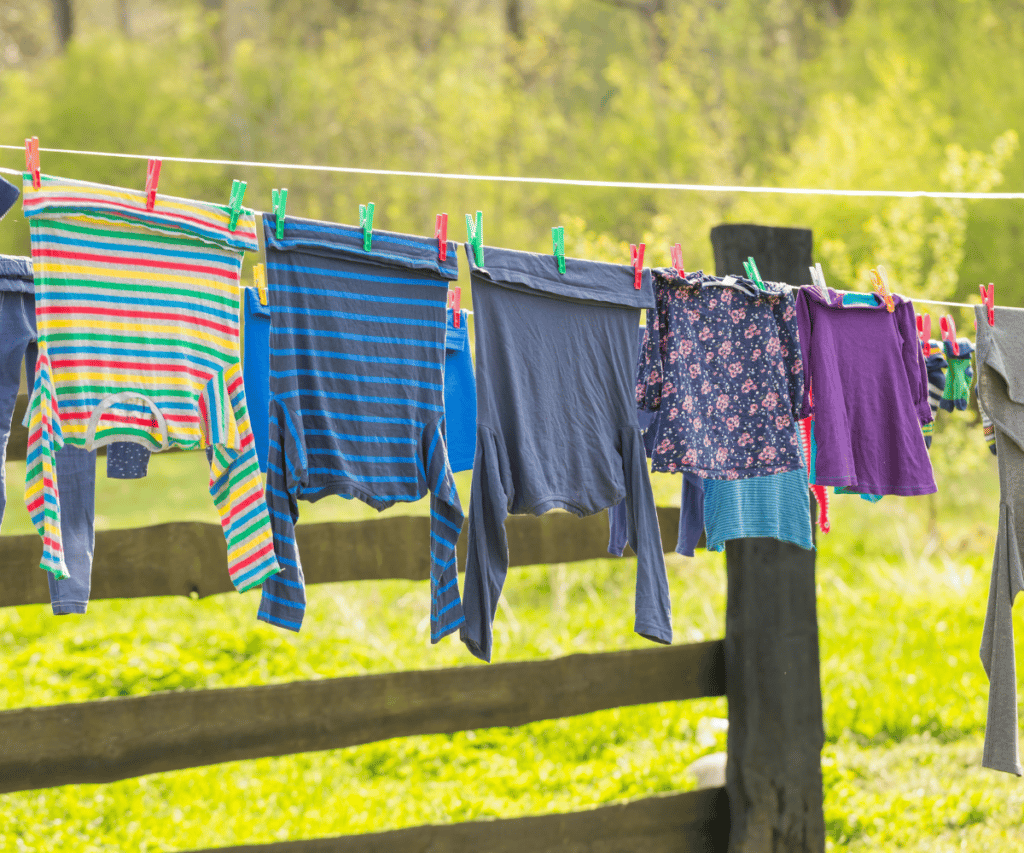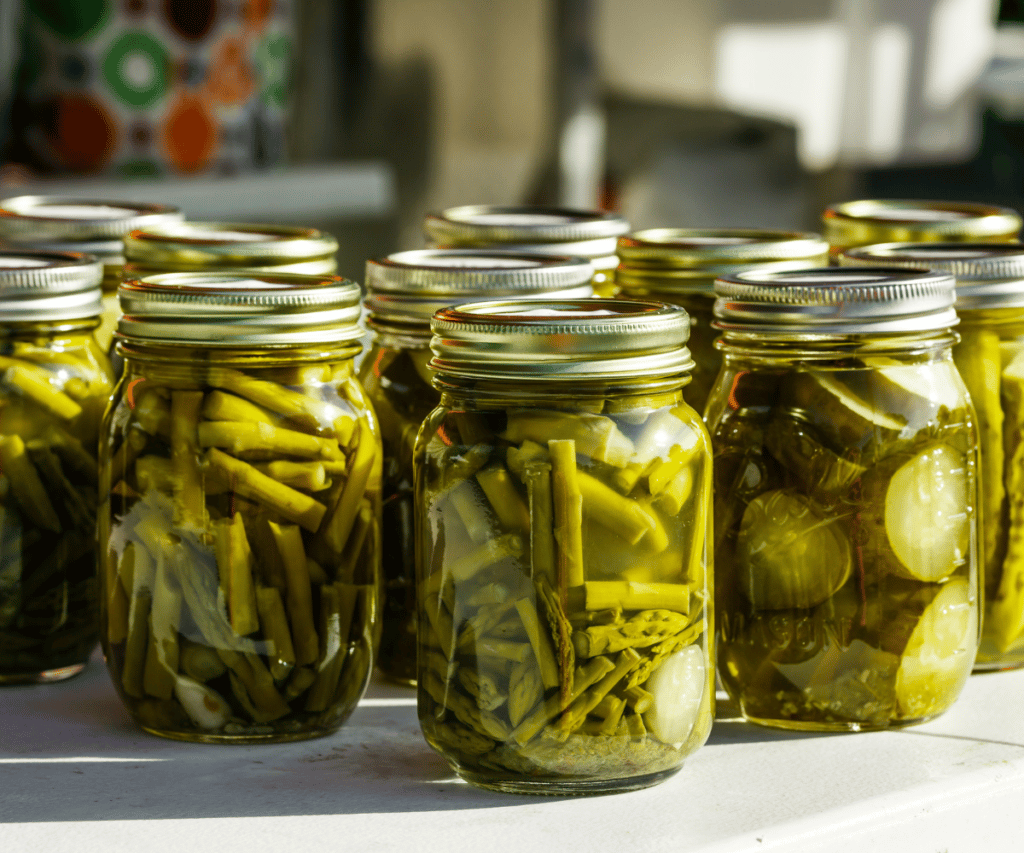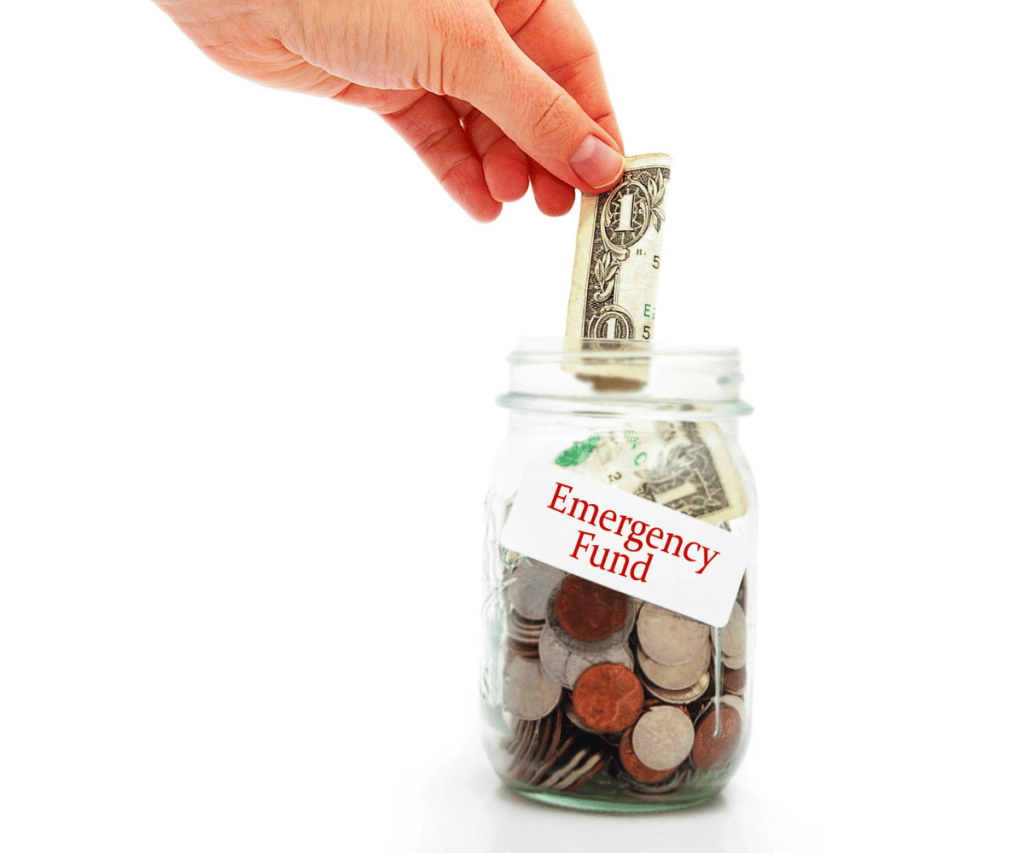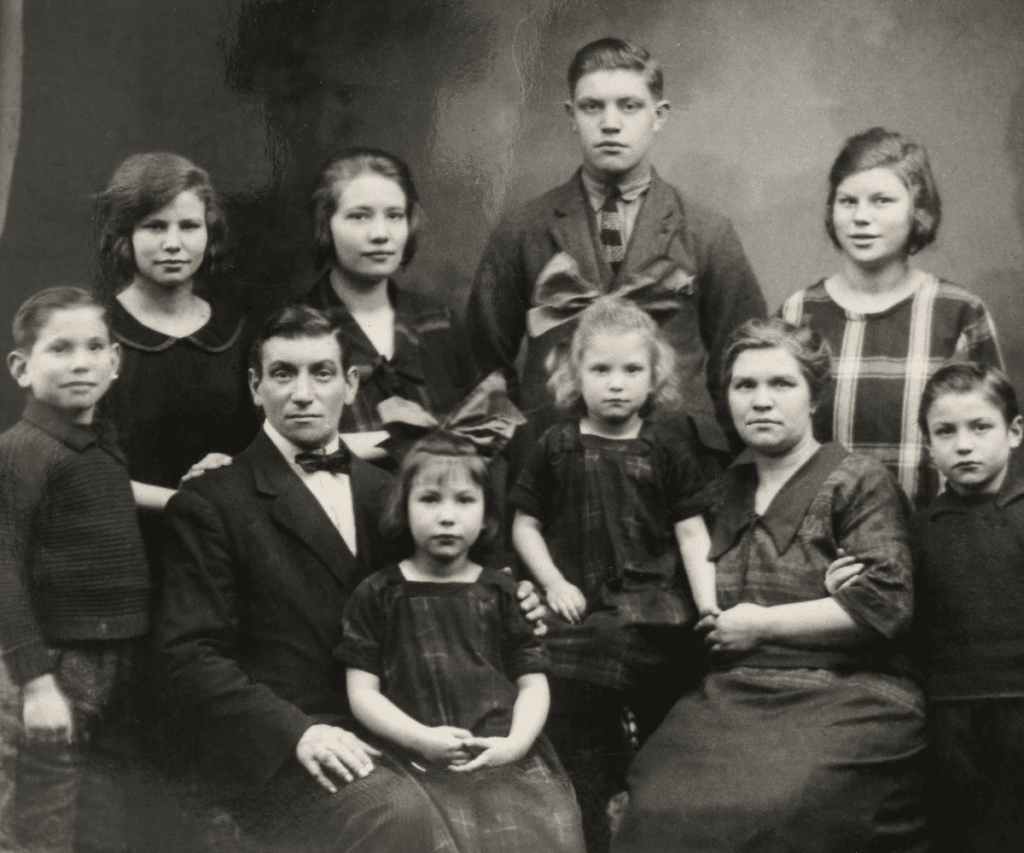63 Frugal Tips From The Great Depression (Save Money Today)
Many of our grandparents and great-grandparents have remembered and passed down frugal tips from the great depression. Most of them learned invaluable skills and went through tough times.
The Great Depression was a severe worldwide depression when the United States experienced a stock market crash in 1929.
The Depression lasted between 1929 and 1939. Many feel we are returning to that same financial situation in modern times.
In these tough economic times, being frugal and learning to stretch a dollar is more important than ever. Luckily, there are many tips and tricks for those who endured the great depression era.
From cooking cheap meals to shopping smart, here are 63 best frugal living tips to help you save money and live more intentionally.
1. Trade Services
If you make a mean loaf of banana bread and your neighbor can hem a pair of pants, trade services.
2. Hang Your Laundry
Skip the dryer no matter what the season. Hang it outside in the nice weather and inside near the fire in the cold weather. Look for drying racks at thrift shops and garage sales.
Extreme Tip: ditch the washing machine and hand wash the clothes.

3. Create A Stockpile
Create a stockpile of items you normally eat. Older generations still do this (and so do I). Find a space in your home to add shelving. It could be a closet, a spare room, or a basement.
Use that for overflow and multiples of nonperishable food items you normally use. Each week, use a little money to start stocking up.
If something happens, you have food for a few weeks (to months) to hold you over. It will be gradual but will pay off in the long run.
4. Turn The Oven On Once
While you’re using it for dinner, bake bread, muffins, and a whole chicken for the week’s lunches while it’s already warmed up.
5. Cook At Home
Cook at home as often as possible instead of dining out. This is a great way to save money on food while enjoying healthier meals free from preservatives and additives.
6. Look For Sales
Look for sales and use coupons when grocery shopping. Every week the grocery store has a sale. This can help you stock up on your favorite foods, reduce your food budget, and save some serious cash.
7. Raise Small Animals.
Raise chickens for eggs, meat (or both), and goats for milk and cheese. Consider pigs and cows if you have enough property and live in rural areas.

8. Don’t Have Credit Cards
Don’t buy if you haven’t earned money for a purchase. Instead, save up your extra money until you can afford to pay for it without borrowing money. The only card in your wallet should be a library card.
9. Grow Your Food
Consider growing your food instead of buying it at the store. This is a great way to save on groceries while enjoying fresh, local fruits and vegetables year-round.
After World War I and II, the Victory Garden became popular for reducing wartime pressure on the nation’s food supply.
The government made it cool for people to grow their food, so food shortages were not as much of a problem. This was a way of life in the United States during these times.

10. Stop Buying One-Use Items
Ditch the paper towels, napkins, and wipes. Use rags to clean up, napkins to wipe your face, and washcloths to clean your hands.
11. Eat Leftovers
Make frugal use of leftovers by repurposing them into new meals or snacks. For example, you can look at it differently.
Use leftover chicken to make a delicious stir-fry or turn leftover rice into a quick and easy breakfast bowl. This is an easy way to reduce your grocery bill.
12. Compost
Turn your food scraps into rich soil for next year’s garden if you have enough property, and compost for friends and neighbors to trade services.
Compost could make a big impact on your wallet and be a great idea for the environment.
13. Use Cash
Many of our grandmothers used cash to pay for everything. They would put their money into envelopes to pay their bills.
There were no debit cards and rarely were there checking accounts. To budget your money, you separate it into the cash envelope system.

14. Buy Quality
When buying new clothes, furniture, or appliances, look for high-quality pieces that will last for many years rather than focusing on trendy fads that will likely go out of style quickly.
15. Find Free Entertainment
Seek out inexpensive or free entertainment, such as local concerts, movies in the park, or hiking trails.
These activities can be as enjoyable as more expensive options and are a great way to spend time with friends and family without breaking the bank.
Consider at-home entertainment like card and board games.
16. Grow Your Fruit
Blueberry bushes and fruit trees like apples and pears are a frugal way to have fruit to preserve or bake with. These are a big part of old fashioned frugal living, and for months, you will have fresh produce.
17. Buy Used
Shopping second-hand whenever possible is one of the best ways to save money on everything from clothing to furniture and home decor.
Many options exist for finding great deals on gently used items, from thrift stores to online marketplaces.
18. Be Stingy With Electricity
Save on utility bills by turning off lights and electronics when not in use, using energy-efficient appliances, and installing programmable thermostats to regulate your home’s temperature more efficiently.

19. Buy Less Stuff
The majority of us shop for sport and not because we NEED something. Figure out what your wants look like and what your needs feel like. Only buy things when you need them.
20. Reduce Waste
Take steps to reduce waste in all areas of life, such as reducing overall consumption, recycling whenever possible, and composting food waste instead of throwing it in the trash.
21. Be Mindful Of Spending
Be mindful of your spending habits and work to curb unnecessary expenses, such as buying coffee or snacks every day or subscribing to premium TV channels that you rarely use.
22. Embrace Frugal Hobbies
Embrace frugal hobbies like gardening, crafting, and cooking, which can help you save money while providing a creative outlet and a sense of satisfaction. One of the great frugal tips from the great depression.
23. Reduce Taxes
Look for ways to reduce your tax liability, such as contributing to a retirement account or charitable giving, which can help you keep more of your hard-earned money.

24. Be Frugal With Self Care
Consider frugal alternatives to costly services like professional hair care or fancy spa treatments.
Do your hair with what you already have, and have your loved one rub your feet. These things can help you achieve similar results on a budget.
Find frugal ways to pamper yourself, such as taking baths with natural ingredients or enjoying a DIY spa day at home.
These simple pleasures can be incredibly relaxing and rejuvenating without breaking the bank.
25. Involve Your Kids
Make frugality a family affair by involving your kids or loved ones in frugal activities like cooking, gardening, and DIY projects.
This can help teach your kids the value of saving money while encouraging them to get creative and try new things.
26. Have A Budget
Keep frugality top of mind by keeping track of your expenses and creating a budget to help you stay on track. This can help you make frugal choices throughout the year and better manage your finances.
27. Make Your Own
Resources to learn new skills are in abundance and at your fingertips. Need a new table? Make your own out of recycled wood. Make your clothes when you can do it cheaper than buying.

28. Create Homemade Gifts
Put your crafty side to work and make things for people they can use instead of more stuff to clutter up their homes. Consider consumables. People love homemade cookies.
29. Fix It Instead Of Replacing It
Save money and learn new skills by fixing the faucet or clothes dryer instead of throwing it away. Even if you are not a skilled DIY-er, most problems can be easily fixed with some trial and error.

30. Preserve What You Create
Whether freezing a pot of soup or canning tomato sauce from the garden, learn the skill of canning and dehydrating so you can eat well all seasons.
31. Reuse What You Can
Reuse glass jars instead of purchasing plastic storage containers. Reuse bags that food comes in for leftovers. Incorporate a spending freeze on all things necessary, and don’t let things go to waste when they could be used again. Keep your eyes out for reusable products that you can use in a new way at no cost.
32. Fix And Make Your Clothing
Repurpose old clothes for children’s clothing and quilts. Make your aprons, curtains, and pillowcases with fabric from other sources with basic sewing skills.
33. Don’t Waste
Do not waste a thing. Whether this is the last drop of toothpaste, the chicken carcass from last night’s dinner, or the wrapping paper from last Christmas. Use every last bit of everything you have.
34. Wear An Apron
Wearing an apron isn’t just fashionable; it’s practical. It is a very old-fashioned practice, but it will protect your clothes and allow you to wear them for many more years, saving you a lot of money. One of the great frugal tips from the great depression.

35. Let The Sun Take The Lead
Follow the sun. Go to bed when the sun goes down, and wake up when the sun comes up. This will not work all year long, but it’s great practice. Read for an hour or two, mend something, or create in the colder months before drifting off to sleep.
36. Ditch The Expensive Cell Phone
The latest and greatest cell phone isn’t a need. Communication is. Do you need a smartphone?
Nobody needs all of the world’s information at their fingertips all of the time. Downgrade to a normal phone and leave it on the counter in the kitchen.
Extreme tip: give up the cell and return to a landline.
37. Utilize The Local Library
Use the local library more. This is a great place to spend some time; everything you might need to entertain yourself can be found at the library, from books to movies and music. Some even have small appliances that you can borrow.

38. Cook From Scratch
Everything you normally buy at the grocery store can be cooked at home using simple ingredients.
Bake your bread, make pasta, mix a batch of muffins, and blend mayonnaise. These frugal habits might take longer than picking them up at the grocery store, but it will save a lot of money. One of the simplest frugal tips from the great depression.
39. Use Home Remedies
Find a book at the second-hand store and utilize the recipes for things that might help modern medicine. Grow an herb garden. Some things don’t need a visit to the doctor and can be treated with tea or spice.
40. Community Involvement
Become more involved in the community. Churches have ample opportunities to get involved whether they are members or not.
Our community churches run the food pantry and love having volunteers. You can even work for a bag of food.

41. Create More Frugal Recipes
Foods can be simple, cheap, and delicious and still nourish your body.
42. Use Natural Cleaners
Clean your home with natural remedies.
Many times water and a cloth will do a fine job. With the invention of microfiber cloths made with antibacterial properties, you can ditch many commercial cleaners and use these.
Also, make your cleaning products with baking soda, lemon, and vinegar. These homemade cleaners will become your best cleaning friends.

43. Add Layers
Layer up to stay warm. Put on a sweater or a turtle neck to stay warm when the weather starts to turn to save money on heating supplies.
44. Bacon Grease
Save bacon grease. Use it to cook other foods and grease casserole dishes.
45. Skip The Air Conditioner
Consider not running the air conditioner when looking for ways to save money. Keep cool in the summer by using fans, dressing appropriately, or finding a cool spot to hang out at the hottest part of the day. Make sure your home is insulated properly for both cold and hot weather.

46. Stop Buying Water
Stop buying bottled water and go with a reusable water bottle.
Extreme Tip: reuse a jar with a lid for water.
47. Heating Alternatives
Find alternate sources of heat, instead of using electricity or fuel oil to heat your home. Consider looking for a wood stove and free wood to do the same job. Chop, split, and stack your wood all summer to save money on heat all winter.

48. Use More Candles
Make your candles for light. Use lanterns and candles for light instead of turning on every bulb in the house. Reminder, candles aren’t just to make your house smell good! One of the best frugal tips from the great depression.
49. Upcycle
Find things for free on the side of the road or online. Traveling to a college town after the semester ends will often lead you to free furniture that can be painted o cleaned. College students would rather leave it than pack it up and take it home. Look for Facebook groups that offer free things.
50. Use A Grocery Strategy
My mom has always shopped the flyers. She checks out what’s on sale and only buys those items. Now that she’s been doing this for years, she can stock up on the items she eats and rarely buys anything if it’s not on sale.
51. Change The Oil
Doing small upkeep jobs on your vehicle is an easy way to save money. Changing the oil, replacing fluids and even changing your breaks are all jobs that can be done with a little knowledge from Youtube or a book.

52. Borrow When You Can
Instead of buying something you might only need occasionally, consider borrowing it from a friend or family member. Things like drink dispensers or triple crock pots aren’t normally items you would use daily. Consider borrowing them instead of buying them. Another of the frugal tips from the great depression.
53. Control Your Emotions
I’ve seen the meme that says, “Happy? Target. Sad? Target. Bored? Target.” Just because you feel emotions doesn’t mean you need to go shopping.
54. Find A Second Job
I remember stories of my great-grandfather coming home from work, eating dinner, and then leaving again for another job. When more money is needed, a second job might be the answer.
55. Learn Butchering Skills
If you don’t have the space to raise your beef or pork, purchase whole and butcher them yourself. This will save money by doing the work and purchasing directly from the farmer who raised the animals.
Extreme Tip: Hunt for deer, elk, and rabbit. Then butcher your own.

56. Skip Fancy Landscaping
There’s little need for fancy landscaping to make your home look nice. Find free plants and ask your friends, family, and neighbors for plants when they separate theirs. Mostly, make it look clean and mow your lawn. I’m willing to bet most people weren’t too worried about weeds in their lawns. One of the great frugal tips from the great depression.
57. Cut Out Cable
This could also include apps and streaming services. Hook up an antenna to watch local channels for free and find something else to do besides sit in front of Netflix binge-watching Chicago Fire.
58. Limit Loads
Only wash full loads of laundry and dishes. Best to hold off for a full load if you’re going to use the water and electricity anyway.

59. Maintain What You Have
Maintenance on cars, clothes, and homes will save you so much money in the long run. A small leak in the roof is less expensive to fix now than after it leaks through and destroys all your belongings. One of the great frugal tips from the great depression.
60. Don’t Even Look At the Jones’
Keeping up with all the neighbors and what they buy and drive will send you into a tailspin of FOMO. Instead, mind your own business and stick to the plan. They’re probably broke anyway.
61. Conserve Water
This means shutting off the water while brushing your teeth, taking shorter showers or showering every other day, and filling up your watering can while waiting for the water to heat up. Unless it doesn’t cost you anything for water, cut down on your consumption.

62. Skip The Meat
Try eating less meat for meals. Try meatless meals and add meat sparingly. Make pasta the main dish with a couple of meatballs or a stirfry with only one chicken breast cut into chunks. Serve over rice to stretch it a little more.
63. Work Together
People during the great depression counted on their neighbors much more than they do today. When a roof needed replacing, the entire neighborhood came to help. When Mama was having a baby, the neighbors watched the other littles. Casseroles were delivered. Lend a hand when someone needs it.
64. Make One Trip
When you’re “heading into town,” make one trip. Do all errands in one day to save on gas. Limit your car rides to not only save on gas but limit the wear and tear on your vehicles too. This tip is one of the key frugal tips from the great depression.
Extreme tip: only have one car and share it.
65. Have An Emergency Fund
Having some money socked away for a rainy day is always better. Whether you keep it in a savings account or buried in a coffee can under the old apple tree, having an emergency fund will help.

66. Go Smaller
The cost may be substantial, whether it’s a smaller home or a smaller car. Having a 3400 square foot house may not be needed. Consider a smaller home and know that children who share a bedroom are okay.
The same goes for the big SUV gas guzzlers. Each child doesn’t need a separate row. Their relationship may be better off learning to share one bench seat.
67. Make A Plan
Have a plan. Waiting until the last minute normally lends stress and spending more money. Always have a plan, whether it’s Christmas, emergencies, retirement, or back to school.

Final Thoughts On Frugal Tips From The Great Depression
Above all, remember that 1930s frugality is about more than saving money. Instead, it’s about finding a balance between enjoying life and being smart with your resources.
With these simple, frugal tips from the great depression, you can live a frugal lifestyle that makes the most of what you have while allowing you to savor each moment. Many of these tips from that time are still relevant today. Depression-era frugality has a lot to teach us.


